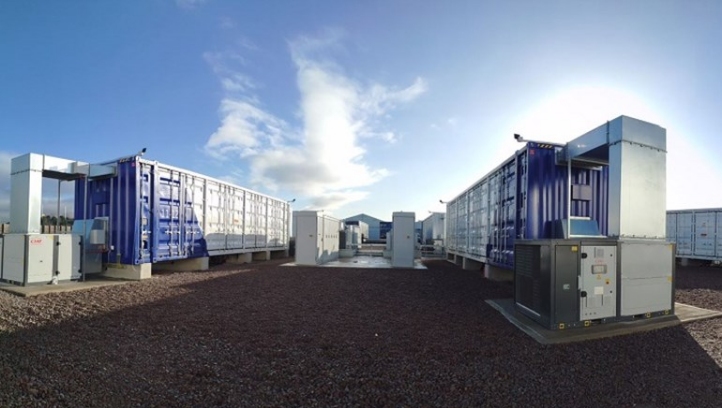Europe's largest battery storage system planned for Teesside
Sembcorp Energy UK has today (14 December) unveiled plans to create a 360MW battery storage facility on Teesside, which would be largest system of its kind in Europe.

Pictured: The existing 70MW battery system. Image: Sembcorp Energy
The developer already hosts a 70MW battery in the UK and has secured permission for a further 50MW, which is due to come online in 2022.
Seperately, it has now announced plans to host 360MW of capacity at the Wilton International Industrial site.
This capacity is more than three times greater than that of the UK’s largest batter array at present – a 100MW system operated by Shell and based in Wiltshire. A second 100MW system is in the pipeline for Capenhurst, near Chester, under plans from Zenobe.
Wilton International is a 2,000-acre site that plays host to industrial facilities including chemical manufacturing, biofuel production and plastics recycling. Sembcorp Energy UK has stated that it already owns enough land at the site to develop the batteries, and the required infrastructure to enable “swift installation” of the new batteries in phases.
Sembcorp Energy UK will need to apply for planning permission for the additional expansion and has not yet announced a likely timescale for completing the project’s phases. In summer 2020, the UK Government’s Department for Business, Energy and Industrial Strategy (BEIS) moved to ease planning restrictions for utility-scale batteries, permitting cells over 50MW in England and arrays over 350MW in Wales. The decision was taken to help stimulate investment amid Covid-19, recognising the battery sector’s role in the net-zero transition and the capacity for shovel-ready job creation.
According to Sembcorp Energy UK, the planned expansion will create 70 new jobs for the region.
On the environmental piece, the point of the battery is to offer balancing and flexibility services to the grid, which will see demand patterns changing as sectors such as transport become increasingly electrified. The units can supply power in “milliseconds”, to the grid, Sembcorp Energy UK said in a statement. The units will also help to maximise the business case for the clean energy generation capacity planned for installation at Wilton International.
“Now, more than ever, flexible energy sources play an increasingly important role in maintaining secure and reliable energy supplies. With a growing reliance on renewables, the UK energy system needs to be flexible and able to respond quickly to changes,” said Sembcorp Industries’ chief executive for the UK and Middle East Andy Koss.
Energy and Climate Change Minister Greg Hands added: “As we shift to a greener electricity grid on our path to net-zero, flexible energy storage will be key to ensuring we get the full benefit from our world-class renewables.
“This project will help put Teesside at the heart of the energy transition, bringing green growth to the region, while helping us deliver on our ambitious climate change commitments.”
According to RenewableUK’s latest Energy Storage Project Intelligence research, the UK had more than 16GW of battery storage capacity planned across more than 700 projects as of February.
Wilton International
The news on the battery expansion forms part of Sembcorp Energy UK's wider plans to decarbonise Wilton International in line with the UK’s long-term net-zero target.
In July, the company announced its intention to use carbon capture and storage (CCS) technologies to “net” the emissions from the 300MW Whitetail gas power station. It has signed agreements with cleantech firm 8 Rivers Capital to help deliver the technologies, which enable gas to be combusted using oxygen rather than air, then using CO2 in working fluid form to drive the turbine instead of steam. The CO2 fluid attracts the new emissions and captures them. The CO2e captured will then be sequestered in rock formations under the North Sea.
The UK Government has, since then, confirmed plans for all unabated gas-fired electricity generation to come offline by 2035.
Elsewhere, Sembcorp Energy UK is looking to purchase hydrogen to help decarbonise industrial heating processes at Wilton International. The company has stated its potential intent to purchase blue hydrogen from BP, which is planning a facility with up to 1GW of capacity by 2030 at Teesside.
The UK Government is notably targeting 5GW of “low-carbon” hydrogen production by 2030 under the Hydrogen Strategy – a feat it estimates will attract £4bn on private sector investment. It sees both blue hydrogen – which is made using natural gas with co-located CCS – and green hydrogen playing a role. This is despite the fact that some studies have found that blue hydrogen could generate 20% more emissions over its life-cycle than burning the natural gas in the first instance.
Sarah George

